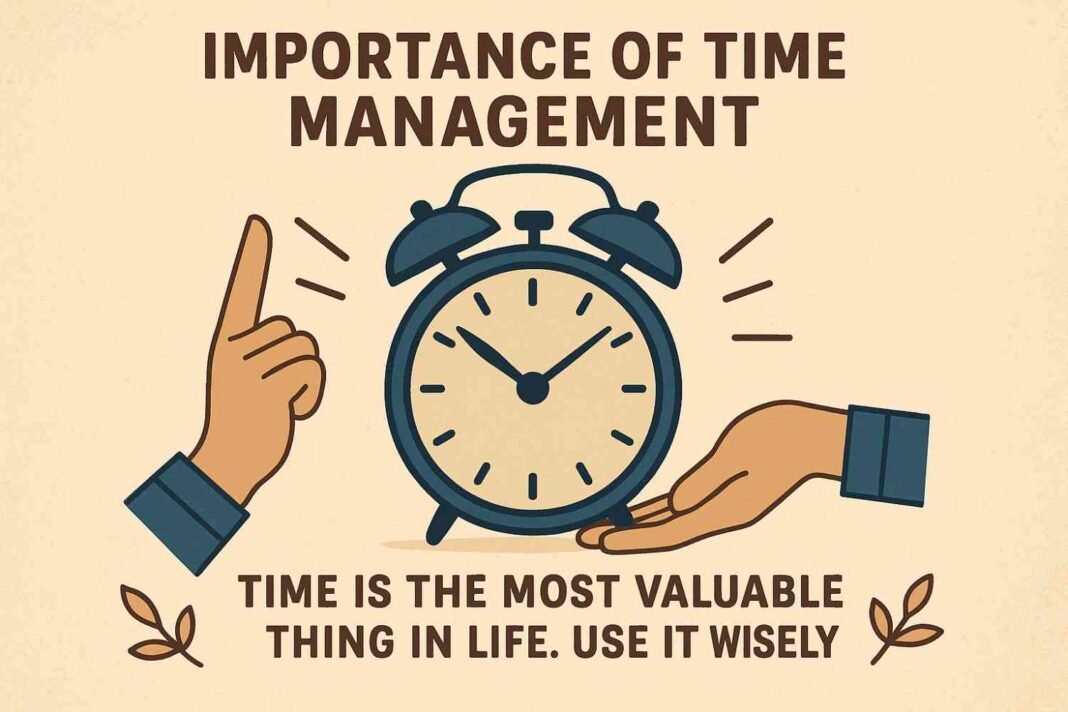The Irreplaceable Value of Time
Time is the most valuable resource we possess. Unlike money or material wealth, it cannot be earned back, borrowed, or recreated. Once a moment is gone, it is gone forever. This makes time the foundation of our lives, shaping our experiences, decisions, and opportunities. For Indians, who live in one of the world’s most competitive and fast-changing environments, effective time management has never been more crucial.
Why Time Management Matters in India
India is home to over 1.4 billion people, each striving to balance academic pressure, career growth, family responsibilities, and social commitments. In such an environment, managing time effectively becomes a life skill that determines not only personal success but also mental and emotional well-being. Poor time management can lead to stress, procrastination, missed opportunities, and reduced productivity. On the other hand, disciplined time use helps individuals stay focused, meet deadlines, and achieve their goals with greater efficiency.
The 5 P’s of Time Management
Experts often highlight the “5 P’s of Time Management” as a simple yet powerful framework to structure one’s life:
-
Prioritize – Identify the most important tasks and focus on them first. This avoids wasting time on trivial activities.
-
Plan – Create a roadmap for the day or week, allocating time blocks for study, work, rest, and personal activities.
-
Prepare – Gather resources and information before beginning tasks to prevent delays.
-
Perform – Execute tasks with focus and discipline, minimizing distractions.
-
Progress Check – Regularly review progress to adjust strategies and stay on track.
This cycle of prioritizing, planning, preparing, performing, and checking progress ensures that time is used effectively, leading to better results in both personal and professional life.
Time Management and Stress Reduction
In India’s urban centers, stress has become one of the most common lifestyle issues. Long commutes, heavy workloads, and academic pressure often leave little room for relaxation. Poorly managed schedules amplify this stress, creating a cycle of anxiety and burnout. By adopting time management strategies such as setting realistic goals, breaking large projects into smaller tasks, and scheduling downtime, individuals can reduce stress levels and improve overall mental well-being.
Academic and Professional Applications
For students, effective time management is a game-changer. It not only improves academic performance but also reduces exam-related anxiety and helps develop lifelong discipline. By planning study schedules, avoiding last-minute cramming, and allocating time for breaks, students can perform better and feel more confident.
In the workplace, time management can make the difference between stagnation and career advancement. Employees who manage their time well meet deadlines, gain a reputation for reliability, and open doors to promotions and leadership roles. With India’s job market becoming increasingly competitive, employers actively seek candidates who can deliver results efficiently and consistently.
Balancing Work, Family, and Society
One of the biggest challenges Indians face is balancing professional life with family and community responsibilities. Cultural expectations often place equal emphasis on work success and social obligations. Without effective time management, many find themselves overwhelmed, unable to dedicate quality time to family, or contribute meaningfully to society. Organizing schedules, setting boundaries, and prioritizing personal time can help create a healthier balance between work, relationships, and social life.
Time as a Driver of Growth and Fulfillment
Beyond productivity, time management has a deeper significance—it shapes personal growth and fulfillment. By reflecting on how time is spent, individuals can identify areas for improvement, learn from past mistakes, and make better decisions for the future. Time management allows people to appreciate life’s fleeting moments, avoid regrets, and live with greater purpose.
Mastering the Gift of Time
Time is a finite, non-renewable gift that dictates the quality of our lives. In a country like India, where every second can make a difference in achieving goals, effective time management is not just a skill but a necessity. By prioritizing wisely, planning ahead, and maintaining discipline, Indians can harness the true power of time—leading to success, balance, and a more meaningful life.








